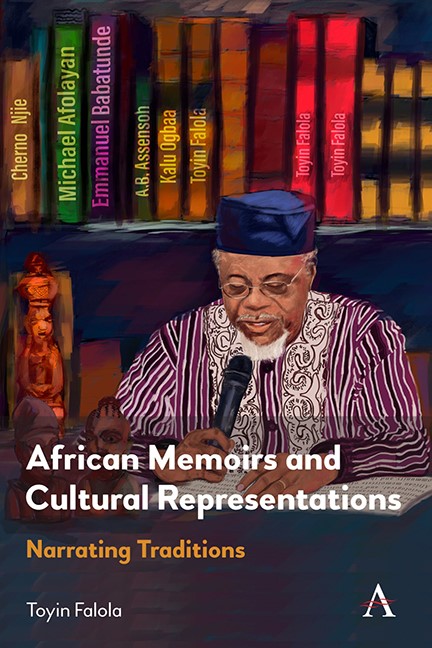Book contents
- Frontmatter
- Contents
- List of Figures
- Dedication
- Acknowledgments
- Preface
- Chapter One Mirror Effect: Narrating the Self through Traditions and Cultures
- Chapter Two The Universal and the Particular in African Memoirs
- Chapter Three The Portraiture of Womanhood in Emmanuel Babatunde’s An African Journey through Celibate Priesthood to Married Life
- Chapter Four Politics, Philosophical Representation, and Culture in Cherno Njie’s Sweat Is Invisible in the Rain
- Chapter Five The Yoruba Worldview, Meanings, and Ideals of Life in Michael Afolayan’s Fate of Our Mothers
- Chapter Six The Indelibility of Igbo Tradition (Home) in Kalu Ogbaa’s Carrying my Father’s Torch
- Chapter Seven Experiences, Reflections, and Refractions on the Cusp in A. B. Assensoh’s A Matter of Sharing
- Chapter Eight Toward a Spatial and Identity Synthesis: Regional Peculiarities in African Memoirs
- Bibliography
- Index
Chapter Five - The Yoruba Worldview, Meanings, and Ideals of Life in Michael Afolayan’s Fate of Our Mothers
Published online by Cambridge University Press: 14 November 2023
- Frontmatter
- Contents
- List of Figures
- Dedication
- Acknowledgments
- Preface
- Chapter One Mirror Effect: Narrating the Self through Traditions and Cultures
- Chapter Two The Universal and the Particular in African Memoirs
- Chapter Three The Portraiture of Womanhood in Emmanuel Babatunde’s An African Journey through Celibate Priesthood to Married Life
- Chapter Four Politics, Philosophical Representation, and Culture in Cherno Njie’s Sweat Is Invisible in the Rain
- Chapter Five The Yoruba Worldview, Meanings, and Ideals of Life in Michael Afolayan’s Fate of Our Mothers
- Chapter Six The Indelibility of Igbo Tradition (Home) in Kalu Ogbaa’s Carrying my Father’s Torch
- Chapter Seven Experiences, Reflections, and Refractions on the Cusp in A. B. Assensoh’s A Matter of Sharing
- Chapter Eight Toward a Spatial and Identity Synthesis: Regional Peculiarities in African Memoirs
- Bibliography
- Index
Summary
Introduction
The Yoruba world is a distinct pool of cultural wealth shared by a group of people united by their rich tradition, deep moral values, unique knowledge system, common beliefs, and shared space and narratives. It is described and interpreted through its language, the words, and the unique and meaningful linguistic and semantic shifts and tones. It is sustained by a universal education in oral literature and “orature” that constitutes the auditory and sensory ambiance for the narratives emerging from the children of Oduduwa. The contours of the Yoruba world and its people—the craft of the Yoruba beliefs, ideologies, and histories, the pantheons of deities and ancestral bodies, and the shared experiences of its members and their connection to a physical space—are uniquely carved into the peoples’ constellations and give them substantiation as a distinct people.
The Yoruba people trace their origin to Oduduwa and the city of Ile-Ife, in the southwest of Nigeria, which is also fabled as the spot where God created all humans, white or Black. This faith and mythology of Oduduwa, spread through his descendants, intrinsically ties the Yoruba world to the physical world, each shaping the other into mirror images. The physical world is assembled out of different domains: the atmosphere, the depths of space, and the astral bodies; land and the vegetation that grows from it; freshwater flowing inevitably towards the depths of the ocean; so is the organization of the Yoruba world. It encompasses its spatial symbolism, temporal narrative spaces, the meaning ascribed to cosmic bodies, and the effects on the people within it caused by interactions between the different divisions of the world.
The word “Yoruba” is rooted at the center of the intersection of language, people, and land. The word is the name of the language, which is the base material of how the people give and communicate meaning. Beyond language and ethnicity, Yoruba represents the choice of words, actions, demeanors, and the biological presentations and meanings of appearance that combine to describe a culture and make it easy to identify someone as a Yoruba based on their ingrained belief system and origin.
- Type
- Chapter
- Information
- African Memoirs and Cultural RepresentationsNarrating Traditions, pp. 91 - 128Publisher: Anthem PressPrint publication year: 2023



